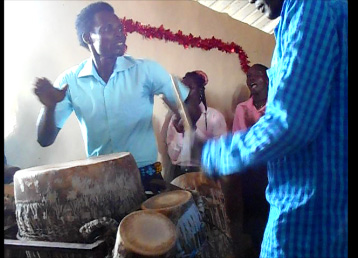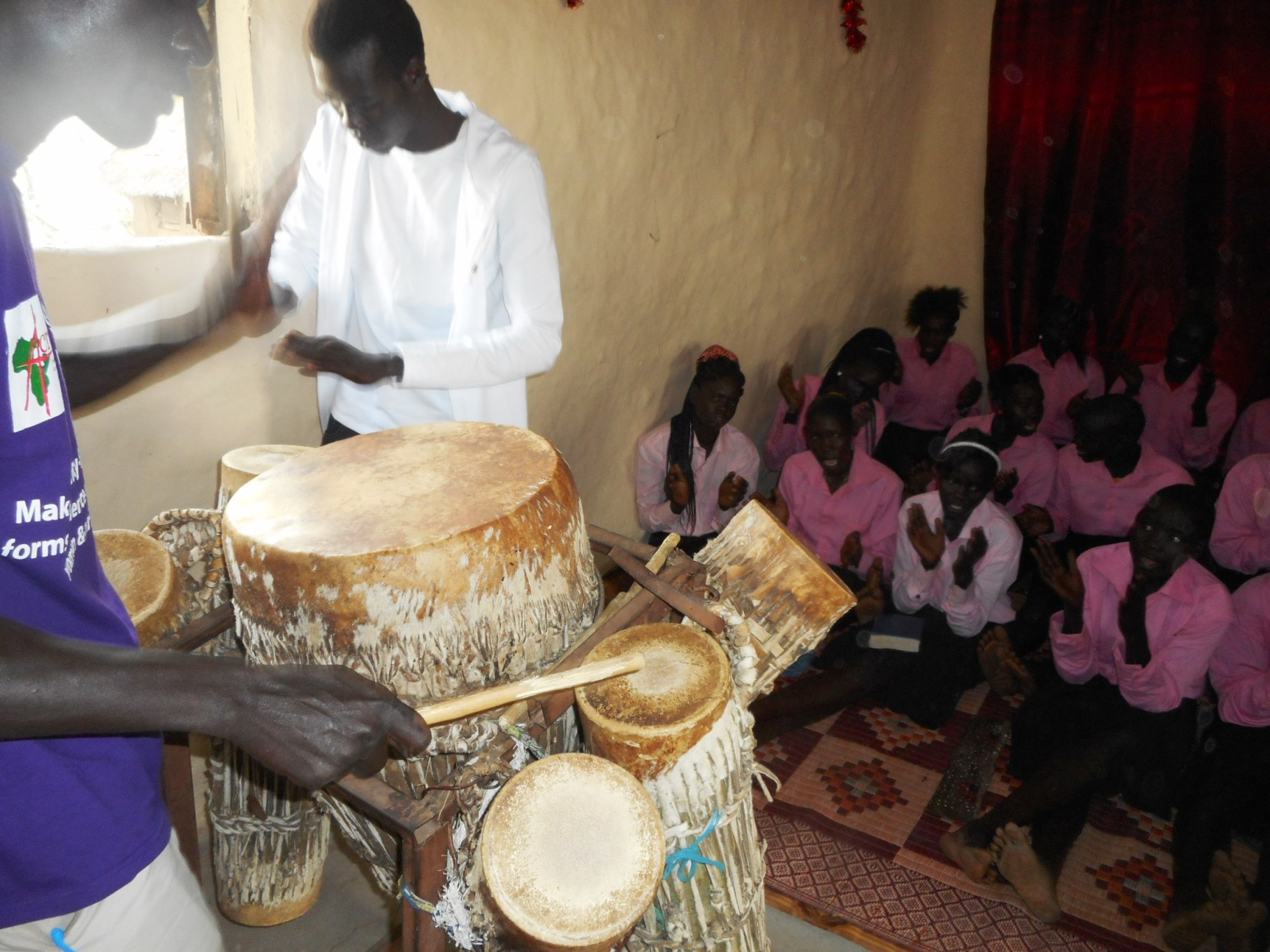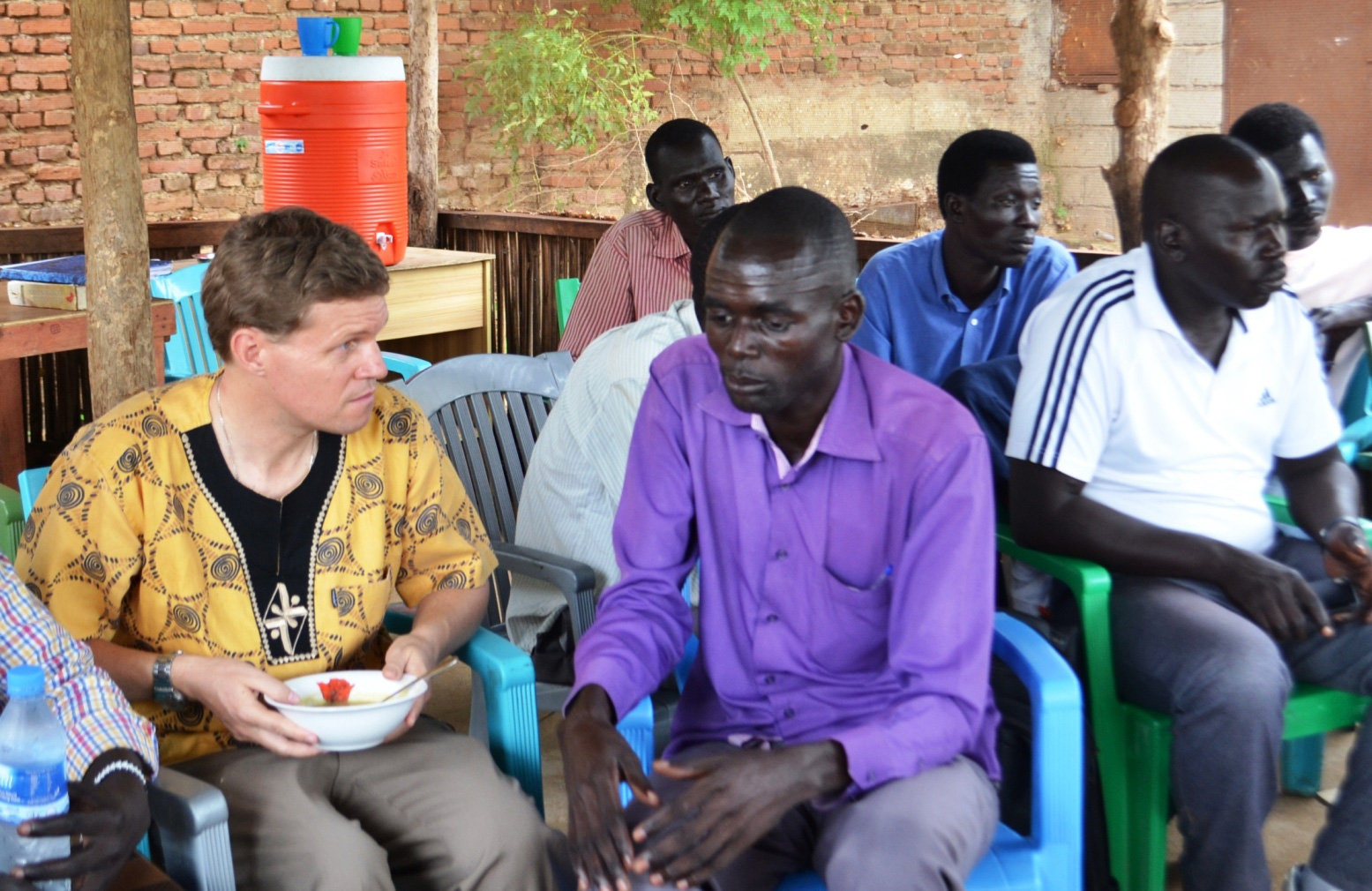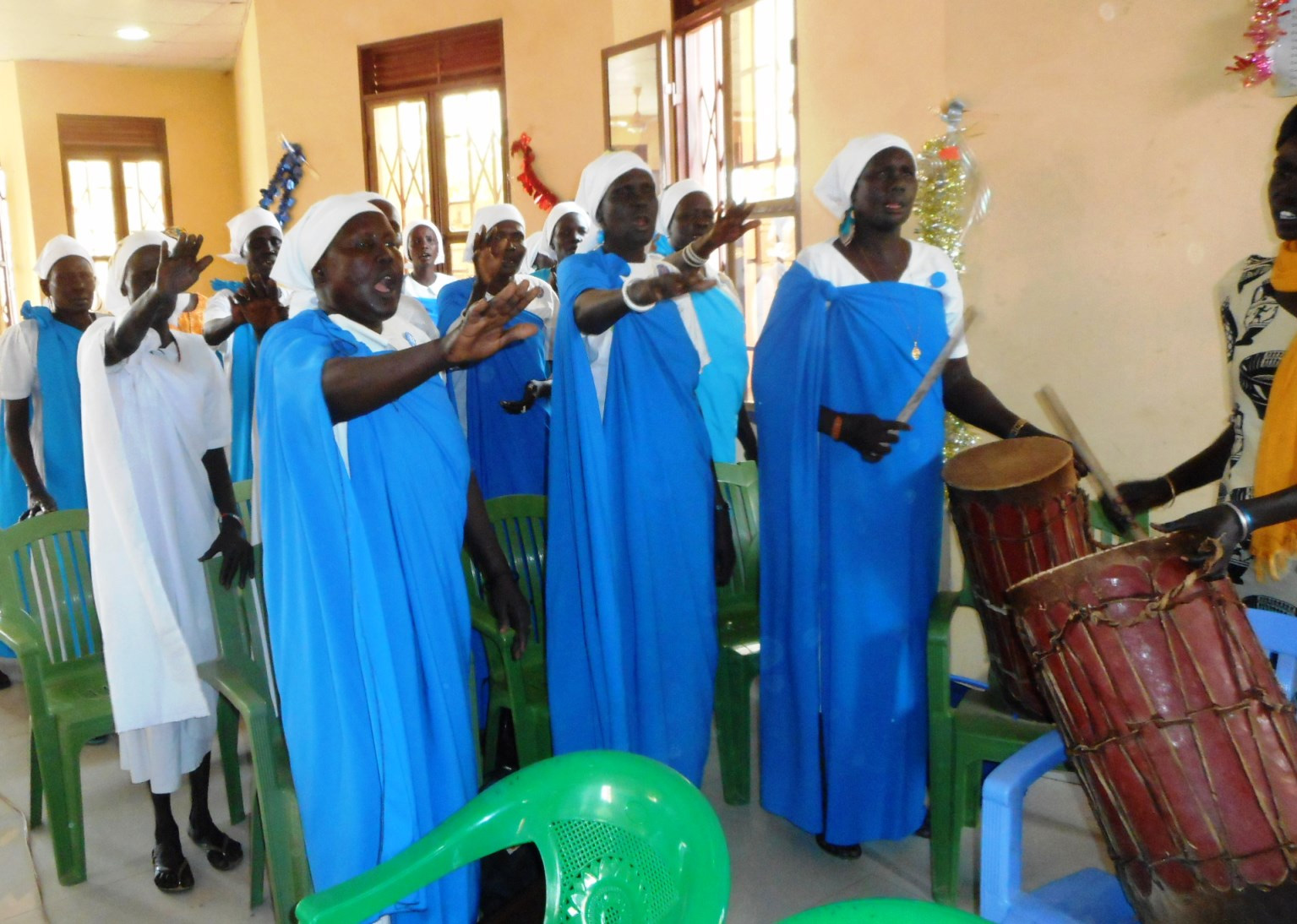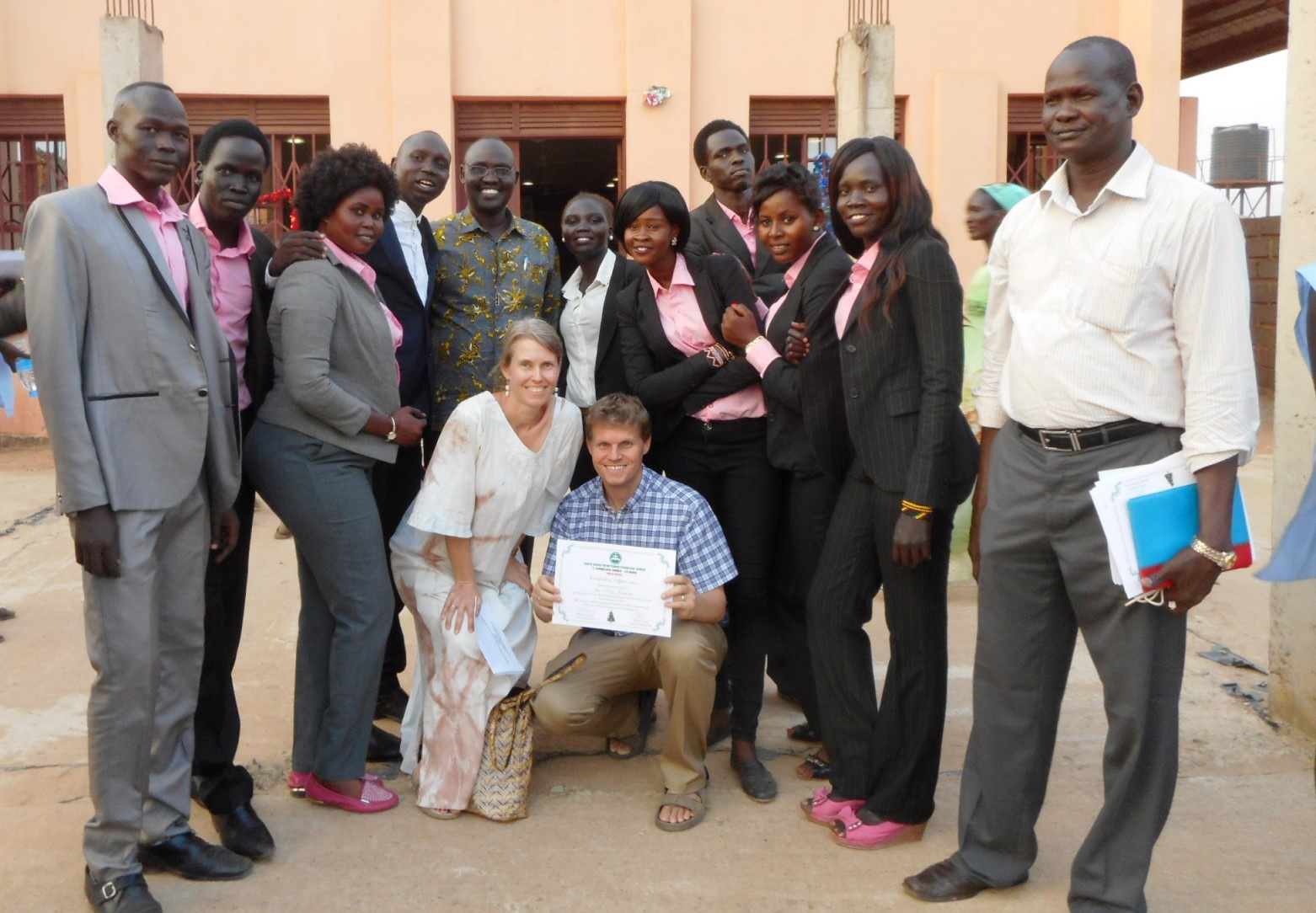A letter from Bob and Kristi Rice
January 2018
Write to Bob Rice
Write to Kristi Rice
Individuals: Give to E200429 for Bob and Kristi Rice’s sending and support
Congregations: Give to D507528 for Bob and Kristi Rice’s sending and support
Churches are asked to send donations through your congregation’s normal receiving site (this is usually your presbytery).
On Christmas morning, the beating of the drums pulsated through us. We clapped, moved, and sang songs of praise, the rhythm of life connecting all of us in the church. Several traditional African drums had been assembled together as a set, and two or three people could play them at once, each with their own particular style. The drummers rotated in and out, which was more amazing because I am sure they had not practiced or organized who would play which song. Rev. Philip Obang, the General Secretary of the denomination, even briefly jumped in to drum (click here to see a video of that song). This set of traditional drums exudes a beautiful and complex rhythm when played by these people who understand the culture of their music and how to drum together.
We are reminded of the need for coordinated rhythm as we launch into a new year here in South Sudan. We want to update you on several pieces of life here, and we pray that God makes meaningful harmony out of them! Bob starts teaching at Nile Theological College in mid-February. He has two classes, Contextual Theology for the “senior” students, and Early Church History for the “junior” students. He recently wrote a blog post describing contextual theology, if you are curious to know more. He has been working hard on research and preparation over the last few months. He looks forward to getting to know his students and hopes they will catch his excitement for these topics. All classes are taught in English, but in most cases English is a third or fourth language for students, so please pray for wisdom and creativity for Bob in presenting the material and for comprehension for the students.
Kristi’s focus with the South Sudan Presbyterian Evangelical Church (SSPEC) is in community development, but we are learning from the experience of the church here that having peace in communities and economic and political stability are foundational to promoting development within communities. SSPEC has actively participated in women’s gatherings and prayers for peace, and it has promoted reconciliation and trauma healing in their communities. In February, SSPEC is sending three members to a training in Rwanda called “Healing the Wounds of Ethnic Conflict.” Kristi will participate in this training with them, and we are praying for God-given opportunities for this team to spread the message of God’s forgiveness within our partner church and more broadly by working ecumenically within communities. The title of this training might sound familiar, because Bob attended this same training with some Congolese colleagues in 2015, and we helped to facilitate workshops on this topic in Congo. We are excited to see God using other parts of our journey, and trust that He is blending the harmony as the pieces come together.
Another drum that adds to the rhythm of life here is learning the language of Juba Arabic. We have continued meeting with our teacher part-time since November and take time each week to review, practice, and be intentional about having conversations in Arabic. We have really enjoyed learning about culture as we sit at a little tea stall and have conversations in Arabic. One frequent topic that comes up is the role of men in the home. “Do NOT help your wife in the kitchen! A man would not do that in South Sudan!” Bob is told, usually in a teasing way, which often starts a lively conversation about culture and food and marriage. We have also learned a few greetings in the local tribal language and enjoy using them as a means of showing our affirmation of various languages and cultures that are present here. (A recent blog post describes in more detail one of our afternoons at the tea stall practicing Arabic). As we attend events in the church — an ordination service, a choir concert, or simply Sunday worship, we are amazed at how people flow back and forth between their mother-tongue tribal languages and the official languages of English or Arabic. Please pray with us for the discipline and time to continue working on our Arabic and improving it, even while the other drums of our roles here threaten to drown out this significant means of connecting and communicating with people.
South Sudan continues to struggle for peace. Because of ongoing conflicts and clashes between political factions or ethnic groups, many South Sudanese people are not able to farm their fields; therefore, the threat of famine remains imminent in many regions. Currently there is a “revitalization” process of the peace agreement signed in 2015 that is trying to end hostilities between the government and rebel factions. The regional block of countries is facilitating this process in Ethiopia. In the midst of insecurity, we are inspired by the perseverance and courage of our partner churches to work and pray for peace and to help people who are in need. Please pray for true peace to come, that those who have been displaced could return to their homes, and for provision of food for those in need.
Thank you again for joining us in prayer and for supporting our presence with the church in South Sudan. We look forward to seeing what God will do through the beautiful souls who have suffered much in this land. The joy and energy that we sensed on Christmas day as the congregation exuberantly sang out their praise in church was a witness to the powerful life and joy that God can give even when the world offers no peace. And just like the drums, with several rhythms woven together to form one complex cohesive unit, we pray that God’s harmony will be shown through our cooperative efforts together to make His Shalom known here on earth.
By God’s mercy,
Bob and Kristi
![]() You may freely reuse and distribute this article in its entirety for non-commercial purposes in any medium. Please include author attribution, photography credits, and a link to the original article. This work is licensed under a Creative Commons Attribution-NonCommercial-NoDeratives 4.0 International License.
You may freely reuse and distribute this article in its entirety for non-commercial purposes in any medium. Please include author attribution, photography credits, and a link to the original article. This work is licensed under a Creative Commons Attribution-NonCommercial-NoDeratives 4.0 International License.
